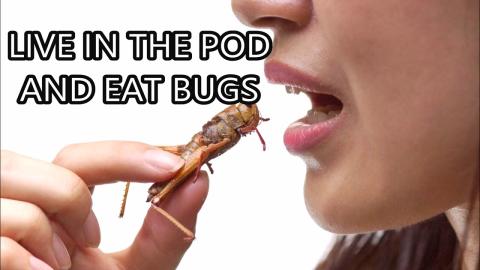Tyson Foods pivoting from meat to BUGS with large investment in bug and INSECT “proteins”

ETHAN HUFF
The largest poultry producer in America is delving into so-called "insect proteins."
Tyson Foods, known mostly for its chicken products, is partnering with a Dutch firm called Protix that raises bugs to convert and manufacture their "proteins" into "food," first in animal feed and eventually in human food.
According to a company announcement, Tyson has agreed to build a giant bug processing and manufacturing facility in the United States with Protix's help. The facility will mass-produce insects for the American market in order to "reduce the burden on the planet."
The new Tyson factory will manufacture what are known as black soldier flies as food. These flies will be fed the feces from other animals – flies love poop, after all – bulking them up so they can then be ground up and turned into "food" for poultry, fish and even household pets.
"They can grow on almost every type of food waste and byproduct you can imagine," says Kees Aarts, the CEO of Protix, about black soldier flies.
(Related: So-called lab-grown "meat" is also a threat to the American public – it is great for investors, of course, but really bad for the families who get stuck eating it.)
Bugs are food for certain animals, not humans
In a separate statement, John Tyson, the current CEO of Tyson Foods, suggested that this new partnership with Protix is merely "an extension of our existing business."
In Tyson's view, adding ground-up black soldier flies to animal feed will bring about "really attractive growth characteristics that would accelerate Tyson."
By the end of the current decade, some experts expect that demand for edible bugs and insects will reach nearly half a million metric tons per year. Currently, demand for "insect proteins" is only around 10,000 metric tons, according to a 2021 report by Rabobank.
If the "greenies" get their wish and their message spreads to persuade a critical mass of the public that "insect proteins" are real food, then the growth of this particular market sector is expected to reach "an exponential speed."
"Today, we're focused on more of [an] ingredient application with insect protein than we are a consumer application," Tyson is further quoted as saying.
Though Tyson does not currently manufacture pet food in any form, it does sell its animal byproducts for use in both pet food and the aquaculture market, which feeds fish.
"Byproducts like animal fats, hides and inedible proteins, if not used or reduced, can end up in landfills," one report explains about how reusing these byproducts rather than just throwing them away is helping to conserve resources.




























Comments
Obvious
Comment
Tyson Foods pivoting
Comment